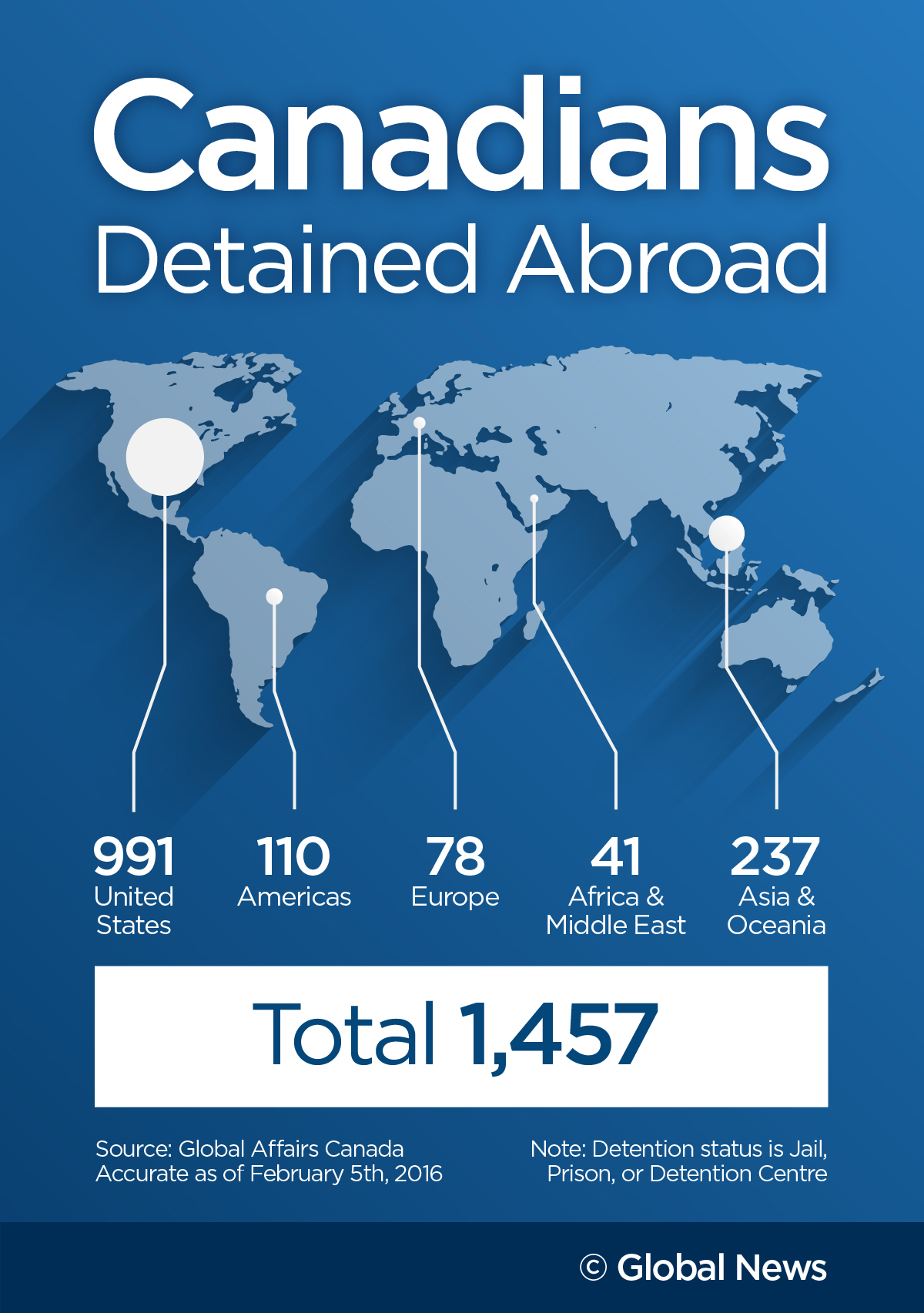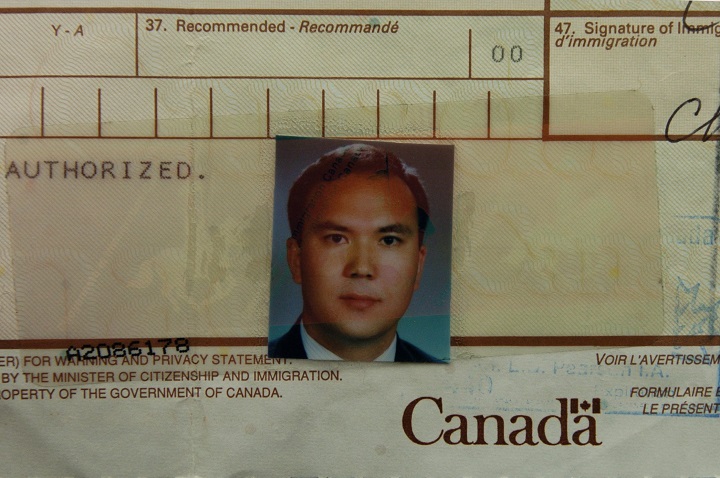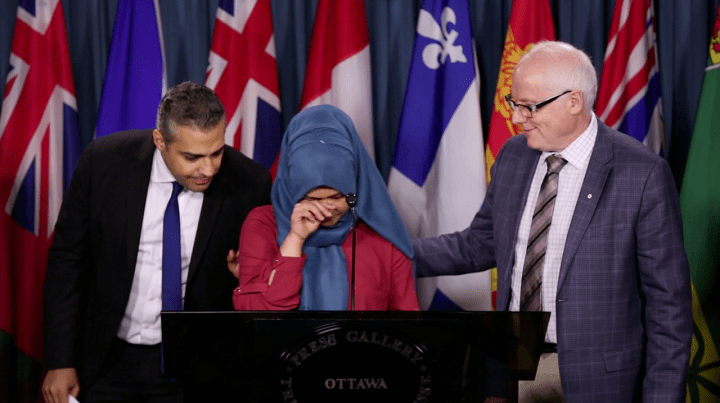Canadians may think their human rights are protected when travelling overseas, but the law is opaque when it comes to the federal government’s responsibilities to its citizens detained abroad.

There are currently 1,457 Canadian citizens imprisoned around the world, but there is no specific legislation in place to protect their rights in a consistent and uniform way.
In its official instructions to Canadians who have been locked up abroad, the federal government does not promise it will intervene – even in cases of human rights violations.
READ MORE: 10 years later, family of Canadian in Chinese prison still looking for answers
“If your international human rights are known to have been violated, the Government of Canada may take steps to pressure the foreign authorities to abide by their international human rights obligations and provide basic minimum standards of protection,” the federal government’s directions read.
“While having dual citizenship is legal in Canada, it may not be legal or recognized in the country of your second nationality, which could limit the ability of the Government of Canada to assist you if you are arrested in that country.
“Canadian consular officials will provide the following range of consular services to Canadian citizens arrested and detained abroad:
- Requesting regular access
- Notifying family and friends
- Facilitating communication with local authorities
- Advocating for fair and equal treatment under local laws
But officials cannot “arrange” for a Canadian citizens’ release from prison, nor can they provide legal advice.
Global Affairs Canada says it takes “every opportunity to raise concerns with foreign authorities” in cases of international arrests, but adds “each consular case is unique.”
“The way we provide consular assistance to Canadian citizens takes into account the local context and other circumstances,” says ministry spokesman John Babcock.
“Before intervening in any case, Canada needs to consider a number of factors, including the potential positive or negative impact on vulnerable Canadian citizens.”
That includes extreme cases that involve allegations of torture.
“Torture and mistreatment of detainees are egregious violations of human rights,” Babcock adds.
“Canada takes the allegations of torture and mistreatment extremely seriously.”
But the question is what exactly “extremely seriously” means for a family of a Canadian detained overseas who has allegedly faced torture and a forced confession.
On the 10-year anniversary of Canadian citizen Huseyin Celil’s controversial arrest and eventual life sentence in China on terrorism charges, his family feels his case has not been taken seriously enough.
There are over a thousand Canadians detained in countries all over the world but according to Amnesty International Canada Secretary General Alex Neve “most of those involve valid criminal accusations” and those accused have had the opportunity to defend themselves.
“That’s not a human rights case. A human rights case is when international human rights standards, important standards that ensure that everyone will have a fair trial, that everyone will be protected from torture and ill treatment, are on the line,

Get daily National news
“In Huseyin’s case, there are very serious human rights concerns here.”
Despite efforts by the Canadian government, rights groups say Celil was given no access to consular officials, faced torture in custody, a forced confession and an unjust trial simply for being an outspoken critic of China’s treatment of the Uighur people – a Muslim minority group in the country’s violence-prone far western region of Xinjiang.
Celil was travelling on a Canadian passport at the time of his detainment in March 2006, but China refuses to acknowledge his Canadian citizenship and reiterates that his case is an internal affair.
“We will continue to handle relevant matter in accordance with the law.”
WATCH: A preview for 16×9’s “The Last Moment I Saw Him”

But for Celil’s wife, Kamila Telendibaeva, and her four young sons in Burlington, Ont., Celil’s Canadian citizenship is only real if it protects him from prison.
“He is Canadian citizen – and then he is not,” Telendibaeva says. “He hasn’t seen consular people from the Canada. He hasn’t seen anyone from the consulate.”
Telendibaeva says Celil’s family in China are only able to visit him once every few months and she often worries about her husband’s health.
“He’s spending a lot of time in the room, the isolated room and maybe they are not taking him outside you know to see the sunlight. That’s why. It’s causing problem,” she said, adding that she has few updates on his condition.
“It’s very little information.”
READ MORE: What to do if a family member dies overseas
Despite Telendibaeva and her family feeling as though Celil has been forgotten in prison, the federal government says it continues to address his case with China – but to what extent?
“Huyseyincan Celil’s case remains important to the Government of Canada and continues to be raised at senior levels,” Global Affairs Canada told 16×9, adding that the ministry is unaware of Celil’s current condition.
“We continue to call upon the Chinese government to permit Canadian officials to conduct a consular visit to monitor Mr. Celil’s well-being. Our goal is to ensure that Mr. Celil is safe and treated fairly, in accordance with international norms.”
The case highlights the lack of concrete legislation for Celil and others like him who slip through diplomatic cracks.
“No Canadian statute expressly obligates the government to provide consular assistance to Canadians, even when facing human rights violations abroad,” according to Amnesty International.
Dean Peroff is an international business lawyer with the Council to Protect Canadians Abroad who has more than three decades of legal experience.
He says due process is stifled by “systemic corruption” and “manipulation by political elites” in countries such as China.
“If Canadians think there is rule of law and process in those countries they are sadly mistaken,” he says.
“The reality is that almost all the Canadians abroad and the families I have dealt with, and after they go through the experience, is that they feel abandoned and betrayed.”
Neve says the Canadian government should not rely on discretion in order to take up the case of a Canadian detained abroad. He is calling for new legislation to be put in place to protect all citizens overseas.
“It’s up to the Canadian government to decide which cases they will take up, which cases they will take up vigorously, which cases they will take up with reluctance, which cases they will ignore,” he says.
“There needs to be clarity, there needs to be consistency and there needs to be some rights involved.”
Last month, Amnesty International and the Fahmy Foundation proposed a Protection Charter to oblige the federal government to provide equal, non-discretionary consular assistance to Canadians detained abroad.
“That has to change.”
16×9’s “The Last Moment I Saw Him” airs Saturday, March 19, 2016 at 7 p.m.
With files from Claude Adams
Graphic by James Waters












Comments
Want to discuss? Please read our Commenting Policy first.